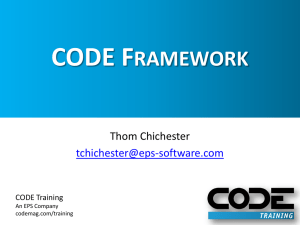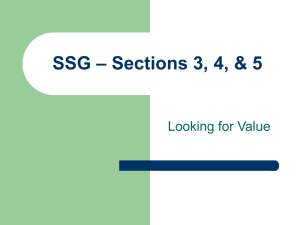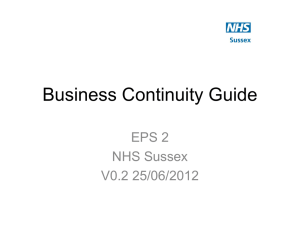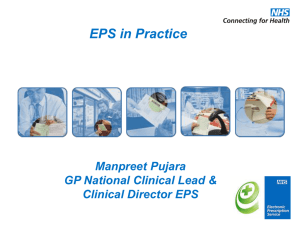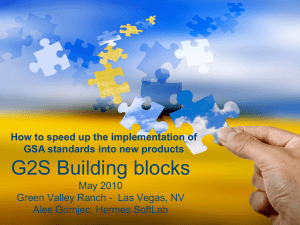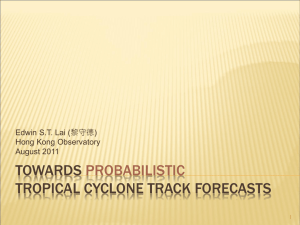Intra-company Transfer EP - Department of Jobs, Enterprise and
advertisement
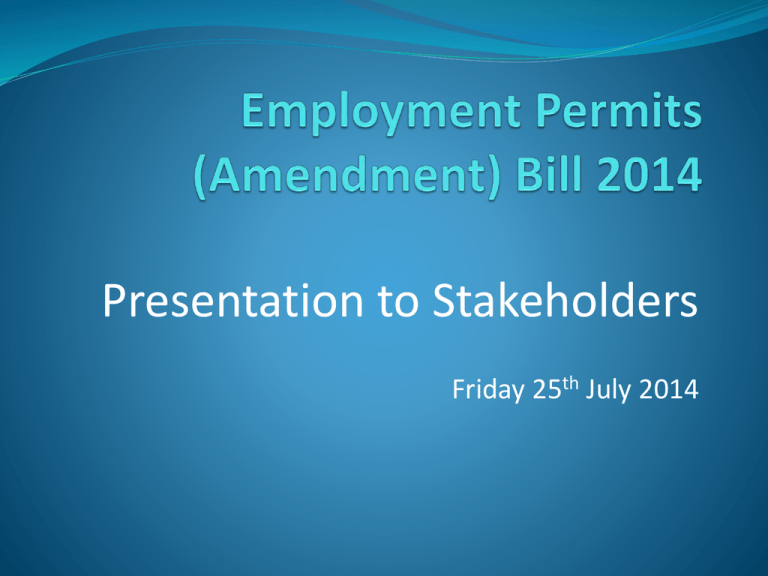
Presentation to Stakeholders Friday 25th July 2014 Introduction by: Mr. Martin Shanagher Ms. Fiona Flood Recap Employment Permit Changes introduced in 2013 Recap EP Changes introduced • Less supporting documentation required and move to declarations • For LMNT: Reduce SOLAS/EURES advertising requirements from 8 to 2 weeks • Newspaper ads need only run for 3 days (from 6) • Remove various restrictions to applicants from within Ireland if they have a valid legal status and GNIB; e.g. Intra-CT EP and CSP EP holders can now apply for other EPs • Remove 5% Restriction re Intra-CTs • Improved Website information • Extended call centre to full working week for inquiries Recap EP Changes introduced • E-Forms introduced • Highly Skilled Occupations List now broadened and correlated with known skills shortages in economy. • Reduction of €30k salary threshold in certain circumstances: • (i) to Industry norm (€27k) for IT Graduates (both graduates of Irish and foreign colleges, and • (ii) to €27k for Specialist Language Support & Technical or Sales Support with fluency in a non-EEA language for client companies of the Enterprise Development Agencies. • All applications considered with reference to remuneration rather than ‘salary’ so that board, accommodation, health insurance can reckon towards remuneration Collaboration with Department of Justice • Providing for ‘Atypical Workers’ - permissions to work for <90 days. • Provides flexible and streamlined mechanism for dealing with atypical employment. • Providing for Jobseekers Authorisations in HSOL area, i.e. temporary permission to enter the State to attend an interview & if successful, then allow EP application within the State. • Pilot 10 day business visas. Are Changes working? • Average waiting time down 51% on Jan. 2013 • Average wait time now 18 working days (June 2014) • Average wait time steady despite 24% increase in volume so far in 2014 (over same period 2013) • 25% more EPs issued in the Information, Communications & Technology Sector in first half of 2014 (877 compared to 702 in same period of 2013) • Over 90% of permits issued are new (i.e. “fresh blood” not renewals) Employment Permits (Amendment) Bill 2014 EPs (Amendment) Bill 2014 Passed all stages in Oireachtas on 16 July Due to be signed by President this week Act and associated Regulations will be commenced by mid- September First Stakeholder Briefing 25 July EPs (Amendment) Bill 2014 Bill extends and amends the EPs Acts of 2003 and 2006 to: provide flexibility to deal with changing labour market, work patterns and economic development needs provide for a robust EPs regime which will provide clarity and certainty to potential investors and employers, both indigenous and multi-national, to better enable their business planning and HR decision-making; and address recent deficiencies identified by the High Court in Younis case (defence for employee, can take case for civil remedy) Regulations New Bill will be supported by a comprehensive set of regulations which will include the following: Names and fees for each EP category Eligible and ineligible employments for each EP category Minimum levels of Remuneration for each EP category Documentary requirements for each EP category Registration or accreditation requirements for relevant employments Requirements of the Labour Market Needs Test Applications forms for each EP category Notification and review forms Changes in EPs (Amendment) Bill 2014 New Offence Provisions: Section 2 of Act of 2006 – expanded to include the Connected Person and Foreign Employee in the requirement for an EP in an Intra-Company Transfer scenario. Section 19 of Act of 2006 – expanded to include the Connected Person and the Foreign Employee in the misuse an EP. Section 23 of Act of 2006 - expanded to include a prohibition for a connected person from recovering any charge, fee or expense arising out of the application or renewal of the EP. Section 24 of Act of 2006 - expanded to include the surrender of the EP on the termination of the duties/training in an IntraCompany Transfer scenario. Section 27 of Act of 2006 - expanded to include the retention of records by the connected person. Changes in EPs (Amendment) Bill Policy Changes: Labour Market Needs Test - retains and extends the requirement for a LMNT for all new applications, regardless of applicant, for General and Contract for Services EPs, with certain grounds for waiver including: Where employment is one of the specified shortage occupations, Where remuneration is €60,000 or over, Where application has been recommended by an Enterprise Development Agency, In the case of a former permit holder who has been made redundant, and Where General EP application is in respect of a Carer with a proven history of caring for the sick person. Changes in EPs (Amendment) Bill 50:50 Rule – retains and extends the 50:50 rule to all applications, both new and renewal regardless of applicant, with certain grounds for waiver including: for enterprise start-ups with enterprise agency support for a period of up to two years in the case of a Critical Skills, General or Intra-company Transfer EP. Two years start from date of registration as an employer with Revenue, Employer with a sole employee e.g. Carer in a Private Home, and Renewals of EPs issued pre-enactment. Can be satisfied by the Employer, the Connected Person (Intra-company Transfer EP) and either the Contractor or the Relevant Person (Contract for Services EP). Changes to Highly Skilled and Ineligible Lists • More explicit and based on the Standard Occupational Classification System (SOC), which is used worldwide. • Draws on data collated by the Expert Group on Future Skills (EGFSN) and the Skills and Labour Market Research Unit of SOLAS • Biannual reviews of these lists to ensure that they are responsive to emerging skills needs and changes in skills demand in the economy. Sample Format of new Lists Old Highly Skilled List All Sectors Business and Financial Chartered and Professionals and Certified Accountants; Associate Professionals Actuaries; Management Consultants; Business Analysts; Compliance Specialists; Risk Analysts/Specialists; Tax Experts; Legal Experts and Credit Specialists. Old Ineligible List In the category 'Transport Staff': All drivers including HGV In the category Childcare Workers: Nursery / Crèche Workers, Child Minder/ Nanny New Highly Skilled List Soc code 3 Employment category Soc code 4 Employment with required skills 242 Business, Research and Administrative Professionals 2421 Chartered and certified accountants with expertise in taxation and compliance New Ineligible List 821 Transport Drivers, mobile machine Drivers 8211 8212 8213 8214 8215 Large goods vehicle drivers Van drivers Bus and coach drivers Taxi and cab drivers and chauffeurs Driving instructors Changes in EPs (Amendment) Bill New Notification Obligations: Redundancy – Foreign National Holder of Green Card/Critical Skill or Work Permit/General EP to notify Minister of dismissal by reason of redundancy. The following will apply: Prescribed form Notification within 28 days of redundancy Have a period of 6 months from date of dismissal to seek another job offer. Can apply for a new Critical Skill or General EP for the same employment even though that employment may now be one of the ineligible categories of employment. LMNT waived in the case of a General EP. Changes in EPs (Amendment) Bill New Notification Obligations: Transfer of Undertaking - Employer/Connected Person/Contractor to notify Minister of change of name following a TOU. The following will apply: Prescribed form Notification to be made by: Connected Person or Foreign Employer in the case of an Intra-company Transfer EP Contractor in the case of a Contract for Services EP Employer in all other cases. Permit to be re-issued in new name. Changes in EPs (Amendment) Bill Submission of decision for Review in the case of a Refusal of or a Decision to Revoke an EP. The following will apply: Must use Prescribed form Form can be used for either a refusal under section 12 or a decision to revoke under section 16 Review time extended to 28 days from 21 days in the case of a refusal under section 12 Changes in EPs (Amendment) Bill Refunds and Payments Roll out of Payment of Fees by EFT for Business Users. EFT payment will be requested on receipt of a correctly completed application. 90% of fee refunded in the case of a refused or withdrawn application before issue. New Employment Permit Types 9 types of EPs Critical Skills EPs Intra-Company Transfer EPs Dependant/Partner/Spousal (DPS) EPs General EPs Contract For Services EPs Reactivation EPs Internship EPs Sports and Cultural EPs Exchange Agreements EPs Critical Skills Employment Permit Critical Skills EP The Critical Skills EP is designed to attract highly skilled people into the labour market with the aim of encouraging them to take up permanent residency in the State. Eligible occupations under this type of permit are deemed to be critically important to growing Ireland’s economy, are highly demanded and highly skilled, and in significant shortage of supply in our labour market. Occupations such as ICT professionals, professional engineers and technologists are catered for under this type of EP. Eligible occupations are largely determined in line with the regular analyses of the Expert Group on Future Skills Needs with regard to the labour market requirements in respect of strategically important skills. Critical Skills EP Job Offer of 2 years or more duration. Must be for an occupation specified on the Highly Skilled Occupations List with remuneration of €30,000 or over (based on a 39 hour week). All jobs with remuneration of €60,000 or over (based on a 39 hour week) other then those which are not in the public interest or are listed on the Ineligible Categories for an EP will be considered. A Degree qualification or higher is required in the €30,000 - €59,999 salary range. Applications for Critical Skills EPs for €60,000 or over require a third level degree or equivalent experience relevant to the job. Critical Skills EPs for salaries less than €30,000 will not be considered. The 50/50 rule will apply, however, this restriction may be waived in respect of start-up companies. Critical Skills EP Benefits of a Critical Skills EP No Labour Market Needs Test. Permit holder can apply for immediate family reunification from the Irish Naturalisation and Immigration Services (INIS) of the Dept. of Justice and Equality. Dependants/Partners/Spouses who are resident with permission to remain in the State as a Dependant/Partner/Spouse of a Critical Skills EP holder are eligible to seek any employment (except in a domestic setting) and apply for a Dependant/Partner/Spouse EP which is currently issued free of charge. Critical Skills Permit holder may apply to INIS for permission to reside and work without the requirement for an EP upon completion of the Critical Skills/Green Card EP duration. Intra-Company Transfer Employment Permit Intra-Company Transfer EP The Intra-Company Transfer EP is designed to facilitate the transfer of senior management, key personnel or foreign employees undergoing a training programme , from an overseas branch of a multinational corporation to its Irish Branch. Foreign nationals remain on an employment contract outside the State. There are three parties involved in an Intra-Company Transfer EP. Foreign Employer Connected Person (Irish Entity) Foreign Employee. The connection between the Connected Person (Irish Entity) and the Foreign Employer is defined in the legislation. Intra-Company Transfer EP The application is made by the Connected Person (Irish entity). Senior Management and Key Personnel must be earning a minimum annual remuneration of €40,000 or more , and must be employed with the foreign employer for at least 6 months before transfer. The foreign national undergoing training must be earning a minimum of €30,000 or more, and must also have been employed with the foreign employer for at least 6 months before the transfer. The 50/50 rule will apply to new and renewal applications . However this rule may be waived in respect of Start-Up companies. Intra-Company Transfer EP Intra –Company Transfer EP’s may be issued for an initial period of up to 2 years and may be extended at renewal stage for a further 3 years ( maximum period of stay is 5 years ). Training Permits may be considered for up to a maximum period of 12 months and are non-renewable. Dependant/Partner/Spouse Employment Permit Dependant/Partner/Spouse EP The objective of this type of EP is primarily to support the attractiveness of Ireland as a location of employment for potential and current Critical Skills EP holders and Researchers (Hosting Agreement). Eligible dependant unmarried children, recognised partners, civil partners and spouses (where recognised as such by DJE), who have been admitted to the State as family members of holders of Green Cards/Critical Skills EPs and Researchers may apply. Dependant/Partner/Spouse EP The scheme includes dependants over 18 who were already in the State as part of the family unit prior to their 18th birthday. No Labour Market Needs Test required. The duration of the EP is linked to that of the Primary EP holder / Researcher. Remuneration may be less than €30,000 p.a. but cannot be less than the hourly National Minimum Wage rate. Dependant/Partner/Spouse EP May work for a minimum of 10 hours per week. No Fee. Being permitted to apply for permits in respect of all occupations other than in a domestic setting with the exception of certain carers. The 50/50 rule will apply. Dependant/Partner/Spouse EP If a prospective employee is granted a Dependant/Partner/Spouse EP for the first time in the State then he/she is expected to stay with the initial employer for a period of 12 months (other than in exceptional circumstances). If the first Dependant/Partner/Spouse EP in respect of the employer is less than 12 months e.g. up to main permit holders’ permission to remain from Department of Justice and Equality (DJE) then an application for a renewal of their EP would need to be submitted. After the initial 12 months employee may change employer but a new application for Dependant/Partner/Spouse EP would need to be submitted. General Employment Permit General EP General EPs, which replace Work Permits, are considered for all occupations (unless not in the public interest or listed on the ineligible categories of employment for an EP). The 50/50 rule will apply at application and renewal stage. However, this restriction may be waived in respect of startup companies. Employee must have the qualifications and/or experience for the job. General EP General EP may be granted for a maximum period of 2 years in the first instance and may be renewed upon application for a further 3 years. A Labour Market Test is required but there are waivers in certain circumstances as outlined in previous slide. An annual remuneration of €30,000 applies. General EP Consideration may be given on an exceptional basis with remuneration lower than €30,000 in respect of the following: A Non-EEA Student who has graduated in the last 12 months from an Irish third level institution and has been offered a graduate position from the Highly Skills Occupations List. A Non-EEA Student who has graduated in the last 12 months from an overseas third level institution and has been offered a graduate position as an ICT professional from the Highly Skills Occupations List. Certain roles in Specialist, Technical or Sales Support with support from the Enterprise Development Agencies. Contract for Services Employment Permit Contract for Services EP This was previously catered for under the Work Permit Scheme but due to the complexities involved they now fall under their own scheme. There are three parties involved in a Contract for Services EP: Foreign Contractor Relevant Person (Irish Entity) Foreign Employee. A Foreign undertaking (Contractor) who has won a contract to provide services to the Irish Entity (Relevant Person) on a Contract for Services Basis is eligible under the Scheme. The Department may issue a Contract for Services EP to facilitate the transfer of non-EEA employees to work on the Irish contract in Ireland and where they remain on an employment contract outside the State. Contract for Services EP Permission to work for less than 90 days may fall under the Atypical Working Scheme which is administered by the Dept of Justice and Equality. The application for Contract for Services EP is made by the Foreign Contractor . The employee in question must have been working for a minimum period of six months with the overseas company prior to the transfer and the duration of the transfer is for at least 90 days. Contract for Services EP The contract must be a one to one contract with the Relevant Person (Irish entity ). Contract for Services EPs will not be considered in instances where work is being subcontracted to a third party. Permits can only be considered for the term of the contract. The foreign Contractor must be registered with the Revenue Commissioners as an employer. The foreign Contractor must be registered with Companies Registration Office/Registry of Friendly Societies, if applicable. Contract for Services EP The 50/50 rule will apply for new and renewal applications and can be satisfied by either the Contractor or the Relevant Person. Labour Market test is required, but there are waivers in certain circumstances as outlined in previous slide. Contract for Services EP The details of the contract must be provided on the application form. Contract for Services EPs may be issued for an initial period for up to 2 years and may be extended at renewal stage for a further 3 years (Maximum stay of 5 years). The permits validity will not exceed the expiry date of the contract. Reactivation Employment Permit Reactivation EP These are to enable a foreign national who entered the State on a valid EP but who fell out of the system through no fault of their own or who has been badly treated or exploited in the workplace, to work again. The employee must have previously held an EP. The employee must hold a temporary Stamp 1 and have a “Reactivation EP” Letter from the Department of Justice and Equality. Remuneration must be the National Minimum Wage or higher. Reactivation EP Applies to all occupations except occupations in a domestic setting other than certain carers. The employee must possess the relevant qualifications, skills or experience required for the employment. Labour Market Needs Test is not required. The 50/50 rule will apply at application and renewal stage. Reactivation EP Reactivation EPs may be granted for a maximum period of up to 2 years in the first instance and may be renewed upon application for a further 3 years. Internship Employment Permit Internship EP Internship EPs are to facilitate the employment in the State of foreign nationals who are full-time students (including Post Grad Students) enrolled in a third level institution outside the State and pursuing a Degree course or higher. For the purpose of gaining work experience. Must have a job offer from an employer in Ireland. Labour Market Needs Test not required. Remuneration must be the National Minimum Wage or higher. Internship EP Must be one of the employments listed on the Highly Skills Occupation list. The course of study must be wholly concerned with the skills shortages identified on the Highly Skills Occupation List. It is a requirement for the completion of their course of study. At the end of the internship the employee must leave the State and return to the third level institution to complete the course. Internship EP The 50/50 rule will apply. Internship EPs are only issued for a maximum period of 12 months and are non-renewable. Sport and Cultural Employment Permit Sport and Cultural EP The Sport and Cultural EP is designed to facilitate the employment in the State of foreign nationals for the development, operation and capacity of sporting and cultural activities. Employee must have the relevant qualifications, skills, knowledge or experience. The EP section may consult with governing bodies and a supporting letter from them can be supplied at application stage. All occupations apply other than those listed on the ineligible categories of employment for an EP. Remuneration must be the annual National Minimum Wage or higher. Sport and Cultural EP The 50/50 rule will apply at application and renewal stage. However, this restriction may be waived in the case of Clubs with only one employee. Labour Market Needs Test is not required. Sports and Cultural EPs can be issued seasonally or for up to 2 years depending on the contract. Renewal application may be considered for a period up to 3 years. Permits issued for seasonal employment are non-renewable. Exchange Agreement Employment Permit Exchange Agreement EP This permit replaces the old Exchange Agreement class of Work Permit EP and will cater for EPs for international reciprocal agreements. Exchange agreement EPs are designed to facilitate the employment in the State of foreign nationals pursuant to prescribed agreements to which the State is a party. An example for instance would be the Fullbright Programme for Researchers and Academics. Eligible Exchanges will be prescribed in the regulations. Exchange Agreement EP Employee must be employed, salaried and paid directly by the employer in the State. Be in receipt of National Minimum Wage or higher. The 50/50 rule will apply. Labour Market Needs Test is not required. Exchange Agreement EP Applications can only be accepted which fall under the prescribed exchange agreements. Can only be considered if the exchange or international agreement applies to the foreign national concerned and the application is supported by a letter from the exchange organisation. There is no processing fee for an Exchange Agreement EP. Exchange Agreement EPs can only be issued for a maximum of 12 months and are non-renewable. Remuneration Requirements for the purposes of an Employment Permit Remuneration Requirements for the purposes of an EP Future Improvements ICT Action Plan 2014 and EPs • Strategic Priority 3: “Increase efficiency of the EP system to facilitate access to high level ICT skills from overseas” • Minister happy to see permits issued in ICT sector reach 2,000 EPs p.a. (from 1,450 in 2013) (first half of 2014 = 877) Trusted Partner • What is a Trusted Partner? New Form of Registration available to certain Employers to streamline the EP application process. Pilot Scheme to be introduced Q4 2014 Minister has approved the Scheme for roll-out once post-enactment changes have bedded down Trusted Partner – Main Benefits • Fast turnaround of Trusted Partner applications • Status valid for 2 years • No fee • Reduced paperwork for every EP application applied for under scheme • Faster turnaround of Trusted Partner EP applications eform Current eForm for existing permits system was introduced in Oct 2013 32% take-up so far Target 50% by year end Applications on eForms less likely to be rejected at triage stage (20% vs. 37% on paper form) Next Steps: eForm for new permit schemes Other Actions from ICT Skills Action Plan 2014 • Introduction of Awareness-raising e-Brochure (post- enactment) • Stand at Web Summit 2014 • E-payments from Sept 2014 Any queries or questions in relation to the new legislation can be directed to epbill2014@djei.ie.
